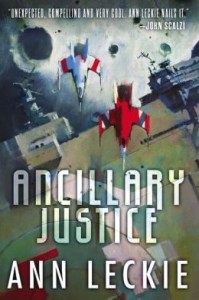 So…I don’t know if I wanted to enjoy this book or not. I probably wouldn’t have picked it up if it weren’t for Ancillary Sword being part of this year’s Hugo nominations, and because I don’t like reading/watching sequels without first having read/watched the, well, first in the series.
So…I don’t know if I wanted to enjoy this book or not. I probably wouldn’t have picked it up if it weren’t for Ancillary Sword being part of this year’s Hugo nominations, and because I don’t like reading/watching sequels without first having read/watched the, well, first in the series.
Ancillary Justice is about Justice of Toren: ship, ten decades, human troops, and a number of sub-units called “ancillaries”. She is also an individual who has named herself Breq. And she comes from a culture where the “generic” pronoun is “she,” rather than “he,” though it is clear from comments others make that this is not true throughout the universe. She tells her story in a non-linear fashion, leaping from past to present to past and back again; thankfully, she never jumps to the future.
Oh, and because she’s an ancillary? She died. Thousands of years before the events of the book. So even if she was human — however the reader defines human, however Justice of Toren defines human, however the Radch defines human — she does not consider herself so. And it’s a question throughout the text, the definition of humanity. Justice of Toren does not view herself the same as others, considers her every move to be deeply calculated as a step toward her goal and yet not everything she does lines up with what she says.
That, of itself, is very interesting to me. So I don’t know what fell apart in the story for me, somewhere around 50% through the book. I just lost interest, and I don’t know if it was me, if it was the story, if it was Breq/Justice of Toren herself. The pronoun thing was, for me, a relatively easy adaptation, so it wasn’t that. Leckie’s prose style is spare, as befits her not-exactly-robotic protagonist; I prefer my text a little more plush but even that won’t hang me up if the story’s good enough. And yet: I think this story could have been good enough, if I could only put my finger on what went “wrong” for me.
I think the problem I’m having is that I just don’t feel very passionate about this book one way or the other. The beginning and the end kept me reading, but once that reading momentum was broken it was easy to put the book down and go do something else. I was engaged, but not engrossed.
It’s entirely possible that the biggest problem I have is there was such a build-up about this book that I might have expected more than she had to give.
So I can’t recommend her. But I don’t discourage the rest of you from reading her. And I’m still curious about Ancillary Sword, whenever that hits my Kindle.
